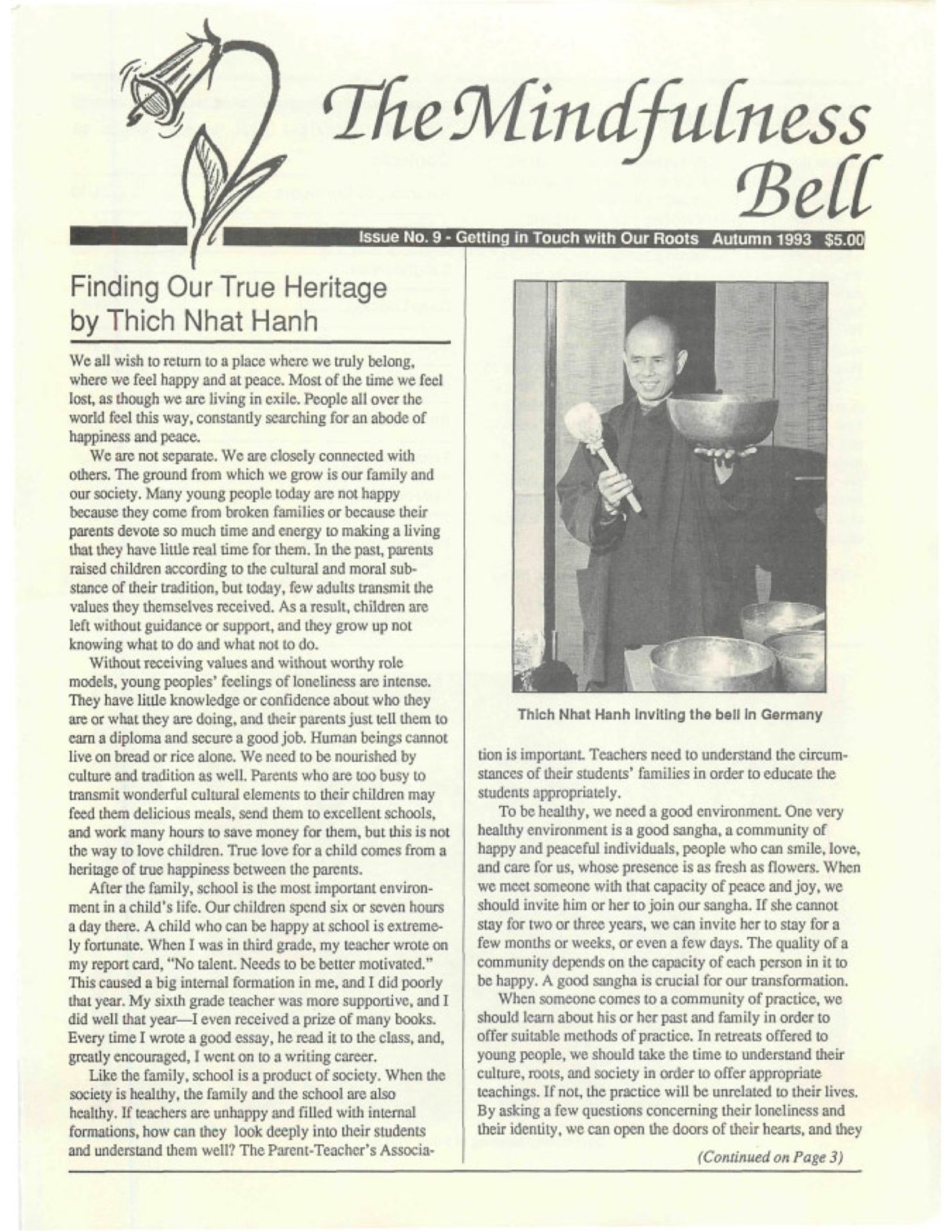By Mack Paul
Despite the poor rewards and aggravations of teaching, I’ve always been attracted to the work. The kids are vibrant, and underneath their veneer of adolescent crudity, they are often heartbreakingly sweet. Nonetheless, I became aware that the stress of it was beginning to take a toll. A few years back a friend introduced me to Thay’s teaching of “being peace,” and I resolved to incorporate a meditative attitude into my daily activities.
Since then,
By Mack Paul
Despite the poor rewards and aggravations of teaching, I've always been attracted to the work. The kids are vibrant, and underneath their veneer of adolescent crudity, they are often heartbreakingly sweet. Nonetheless, I became aware that the stress of it was beginning to take a toll. A few years back a friend introduced me to Thay's teaching of "being peace," and I resolved to incorporate a meditative attitude into my daily activities.
Since then, I have been surprised at how much easier my job has become. When I notice that I am beginning "to lose myself," I pull myself into myself and breathe. I've found that many potential confrontations spontaneously dissipate when I decline to participate. I find that other problems can be creatively resolved if I check my initial aggressive impulse and search for a more creative solution.
I recently had an illuminating experience with one of my more troubled students. This young man, whom I will call Jim, comes from a difficult home environment with an alcoholic father who alternately neglects and bullies Jim. Consequently, Jim resents authority figures and tends to bully his classmates. He finds it difficult to stay on task in school, finding disruption a more satisfying activity than diligence. He has learned, and has articulated this learning to me, that if he behaves badly enough that teachers will let him do what he wants so they can attend to more willing students.
Recently, our entire school was having a stressful day. Jim wanted to go the the gymnasium to watch a basketball game and Mike, the vice-principal told him that he could not. Jim, who hates being thwarted, came into my classroom upset and swept a pile of books off a table so he could sit there. I had an immediate negative response to this and told him to pick them up. He snarled in reply that he would when he felt like it. In return, I blew up and marched him down to Mike's office. Mike refrained from punishing him but just kept him in the office and told him to stay away from me for the rest of the day. Unfortunately, Jim found me after school and rather aggressively informed me that our encounter was my fault because I knew how he responded to people giving him orders—a rationale that I was simply not willing to hear. I told him to "get out of my face" and stomped off. I was, by now, pretty upset. Mike and I decided to have his mother keep him home the next day for a cooling-off period.
By Monday I had pretty well cooled off, but I could see that Jim was still distressed. I could tell that our relationship had been damaged by the incident, but I was not ready to approach him. I suffered with my emotions for the next couple of days, just sitting and breathing with my discomfort. As I sat, I realized that despite his provocation, it was not my intention or desire to yell at him. He missed school one day. I knew that he was not sick and took this as a bad sign, so I called him on the phone and apologized. His response to me was honest and touching and I could hear the agony in his voice as he said, "I didn't know what else to do." I told him that I didn't either and that the incident was behind us.
Since that time I've been gratified to hear some reports from amazed colleagues of Jim behaving in a manner that they find uncharacteristically civil and courteous. His softening has been a palpable phenomenon and, sometimes, he even does his school work. He is showing a bit more willingness to play by the rules. I don't have great hopes that Jim will ever be a model student, but I hope mat he will make it through high school. I had a lot of authority to take revenge upon him for his initial rudeness to me and his subsequent self defense. Many teachers would argue that he should have suffered some consequence for that incident. Unfortunately, many of our students like Jim live very punishing lives and what discipline we do provide them only further alienates them from us and from society. They are often very unpleasant but desperately need someone to be on their side and to patiently show them less self-destructive forms of behavior.
I believe that mindfulness practice has made it possible for me to do just that. Sometimes, when someone misbehaves badly we say, "It is the drugs doing the talking through him." These days I sometimes get the feeling that the practice is talking through me. As I approach the end of this school year, rather than feeling the exhaustion and burnout that are common to this time, I feel a sense of joy in my work and a deep affection for my students and my colleagues as well. I am very grateful for these powerful teachings.
Mack Paul teaches junior high school students designated as "learning disabled" in Norman, Oklahoma.

